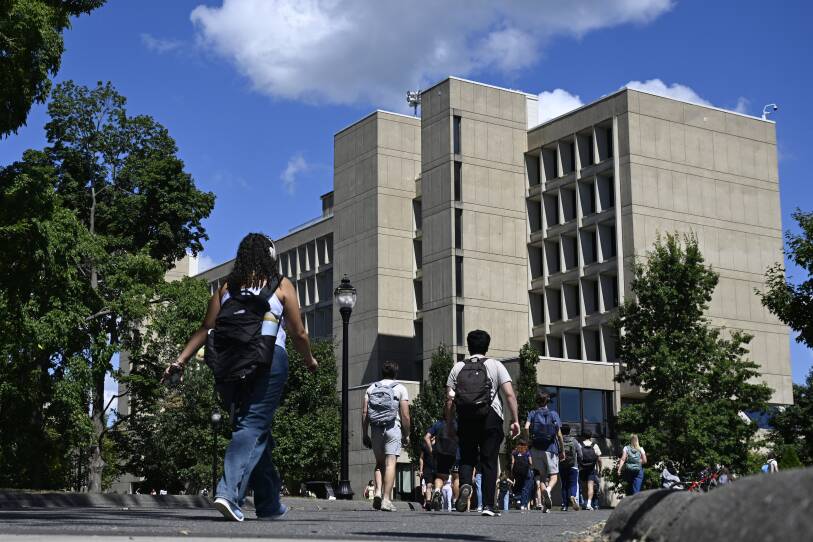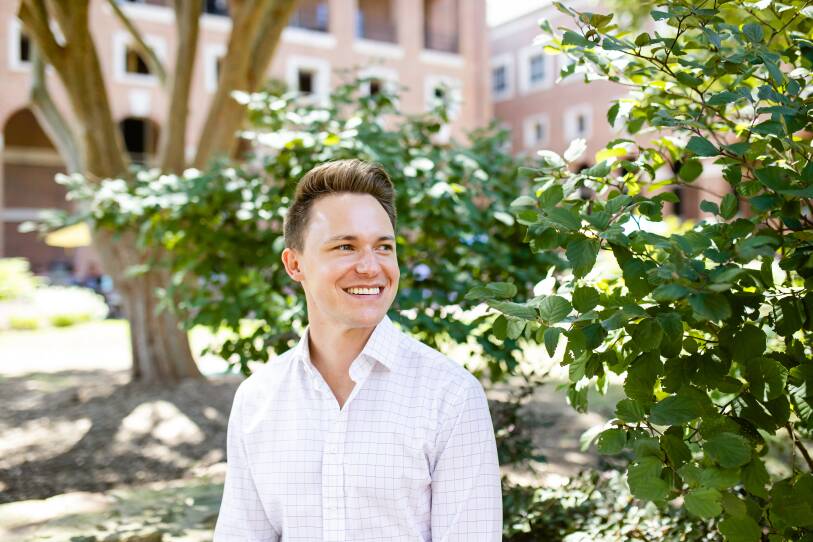A national news network has requested thousands of records from public colleges, including some in Massachusetts. The head of the company says they want to highlight “anti-American” classes being taught on the taxpayer’s dime.
Brian Timpone, founder of Metric Media, told GBH News that his organization asked four-year taxpayer-funded schools around the country for their course materials and number of enrolled Chinese national students. Among local institutions he’s targeted are Salem State University, the University of Massachusetts Boston and Bridgewater State University.
“There’s great public interest in what public universities are teaching students,” Timpone said. “We want to see what they’re teaching and why.”
Metric Media is one of a growing number of media outfits and conservative-led organizations blanketing public universities with demands for syllabi, reading lists, course materials and international student enrollment data. These groups argue they are enforcing civil rights law and holding taxpayer-funded institutions accountable. But some college faculty believe it’s a coordinated campaign of intimidation that undermines academic freedom.
Dan Kennedy, a journalism professor at Northeastern University, said records laws are being “weaponized,” not to foster debate but to intimidate professors and foreign students. For institutions, he said, the demands can seem never-ending.
“There’s a conservative war against higher education,” said Kennedy. “If right-leaning groups are using public records laws to get these materials, then it seems fairly obvious that they’re looking for signs of liberal bias in the classroom.”
Kennedy said he was surprised that Metric Media, long dismissed as a passive content mill, was filing public records requests, a tool more commonly used by investigative journalists. “Maybe this stuff is going to start turning up in their network of 1,200 pink slime local news sites,” he said.
Metric Media runs some 1,265 websites around the country that journalist watchdog groups have characterized as “pink slime” journalism, named after a meat byproduct made from beef trimmings. These websites, they argue, attempt to look like traditional local news organizations but are actually created and funded by partisan groups or hostile governments, often with the help of automated, algorithm-generated services.
Among Metric Media’s websites are 14 linked to Massachusetts with names like North Boston News, West Massachusetts News and Bean Town Times. Stories on North Boston News recently included pieces on gas prices and high school sports statistics.
Timpone, a former TV reporter who attended a Catholic high school in Chicago and then studied journalism at the University of Missouri, dismissed allegations that his company produces slop news.
“Since we started competing with the media 12 years ago, all we do is get criticism from the prevailing media,” he said in a wide-ranging Zoom call from Chicago. “Look, I love journalism. We’re doing the best we can.”
Timpone declined to say who funds Metric Media or even how many people work there, but said his company has invested heavily in its products across the country with “dozens” of staffers located in the United States and overseas.
“We’re trying to just get something going and a lot of that is FOIA, public records, transparency. That’s where our emphasis is because that’s what we can scale,” he explained. “We’re not perfect. Give me your criticism, we’ll try to make it better.”
Timpone said he wants the public to make its own decisions with facts. He plans to publish responses to his open records requests “verbatim,” without analysis.
“When we publish this information, we’ll promote it to parents and taxpayers,” he said, “and let them take it and run with it.”
As a tuition-paying parent himself, Timpone said he thinks America’s public colleges have lost sight of their mission.
“These are schools that were land-grant universities that weren’t created to teach queer theory or to teach some of these, let’s call them, obtuse or not academically intellectual topics,” Timpone said. “Some of the names of these courses, they’re almost like The Onion.”
“I think the founders of all these schools would be horrified to see what they’ve turned into,” he added.

Each individual records request for information comes from a regional news site affiliated with The Coalition Opposing Governmental Secrecy, a nonprofit organization that aims to investigate state and federal government agencies using freedom of information laws. Timpone told GBH News he helped create the nonprofit, but doesn’t run it.
So far, public universities are scrambling to respond to the unprecedented flood of records requests. Nearly 50 days after the requests were filed, Metric Media said out of the 651 requests sent to schools nationwide, 251 have responded. Among the 16 requests sent to public colleges in Massachusetts, Metric Media said five schools have responded.
At first, Salem State told GBH News it had never received any requests from Metric Media or its regional affiliate, Bay State News. Days later, the school admitted two requests had been found “caught in an aggressive spam filter.”
The university apologized to Bay State News and later rejected a demand for a complete list of every undergraduate and graduate syllabus, citing federal copyright protections for “original works of authorship,” including syllabi and instructional materials.
The University of Massachusetts Amherst said it did respond to the inquiry from West Massachusetts News — providing a link to the course catalog and a spreadsheet with enrollment and financial aid data on students with Chinese citizenship.
Officials from the University of Massachusetts Boston did not respond for comment and those at Bridgewater State University said they had not received any requests from Metric Media or its affiliate, the Plymouth Reporter.
Other groups are adding to the universities’ workload, too. In May, the National Council on Teacher Quality, a self-described nonpartisan group founded by a conservative foundation, sought syllabi from Salem State’s master’s program in education, part of a massive nationwide request.
Council President Heather Peske defended the effort, saying districts that hire graduates deserve to know whether they’re being taught “debunked” reading practices. Salem State refused the request, citing federal copyright law.
“The university believes in transparency but also seeks to protect the privacy of both our students and employees, as well as their rights to their own work products,” said Salem State’s general counsel Rita Colucci in an emailed statement.
Similar efforts in other parts of the country have led to online harassment of faculty.
Among them is Christopher Petsko of the University of North Carolina-Chapel Hill. Petsko told GBH News he received a records request for materials in a course he teaches that covers workplace discrimination. The request, sent from The Oversight Project, sought materials from more than 70 UNC-Chapel Hill courses that referenced terms like “diversity,” “gender identity” or “racial preference.” The Oversight Project is a nonprofit linked to The Heritage Foundation, a conservative think tank that helped write Project 2025, a long-term strategy to advance a conservative agenda in the federal government.

Petsko said he refused to share his syllabus, worried about how the group might use it. Then he posted about the request on LinkedIn, reminding colleagues that even public colleges can consider syllabi to be intellectual property. He said the post went viral, and he started to get attacked online.
“They said I was too woke or too gay to be a responsible social scientist or educator,” he recalled.
Now, in this highly polarized moment on college campuses, he hopes telling his story can cool tensions.
“I want to educate members of the public on what it is that professors actually do,” he said. “There’s this image in people’s minds that professors are extremist progressives who are trying to indoctrinate young people with ideas that maybe go against traditional conservatism, or nationalism itself, or capitalism, and I think that that’s actually not what academia is.”
Despite the drumbeat of criticism about American colleges, Petsko said most professors devote their lives to creating knowledge and passing it on to students as honestly and accurately as they can.
Conservative groups argue professors like Petsko are overreacting and their complaints are overblown.
“If they are abiding by the law, then they should not be concerned about what they’re teaching,” said Jonathan Butcher, an education researcher at The Heritage Foundation. Butcher’s research finds colleges and school districts are defying federal bans against DEI programs by disguising them.
“The goal here is to make sure that the Civil Rights Act is implemented and adhered to by public universities in particular,” Butcher said. “If they weren’t doing anything that violated the law, then what do they have to worry about?”
Timpone told GBH News he dismissed arguments that syllabi at public universities are intellectual property or that providing international student information would violate privacy protections.
“Go ahead and make that argument in court — make it in public opinion,” he said. “It’s laughable.”
“If you want privacy rights to what you are teaching, go to a private school then that won’t release it,” he said.





